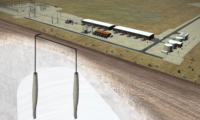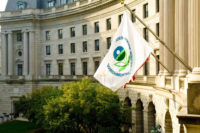The Biden administration plans to award $4.6 billion to states, cities, tribes and U.S. territories to develop and build projects to reduce carbon emissions, particularly in environmental justice communities, officials told reporters Sept. 19. Projects could range from updating building codes to installing solar and battery storage projects and doing school energy-consumption retrofits.
The funding will go toward implementing plans with the most potential to reduce carbon emissions, in the communities most severely impacted, said Michael Regan, administrator of the U.S. Environmental Protection Agency.
There will be two competitions: one for state and metropolitan areas, the other for territories and tribes. EPA anticipates awarding approximately 30 to 115 grants ranging between $2 million and $500 million for states and cities; and 25 to 100 grants between $1 million and $25 million for tribes and territories. The deadlines to apply are April 1 for the general competition, May 1 for tribes and territories.
The funds are the second major tranche of funding to be distributed through the Climate Pollution Reduction Grants (CPRG) program established under the 2022 Inflation Reduction Act. The EPA announced in March the first apportionment—$250 million in planning grants to develop local, statewide and regional plans to reduce carbon emissions.
Nearly all states and a number of metropolitan areas—some within the four states that rejected the funds—took advantage of those grants. For example, though the state of Florida rejected the funding, the Miami-Ft. Lauderdale area is participating in the program.
The grants are designed to put communities “in the driver’s seat” in developing carbon emission reduction programs, said John Podesta, President Biden’s senior advisor on Clean Energy Innovation and Implementation. “The program is intentionally broad in scope to give states, tribes, territories and cities the flexibility they need to design their clean energy future.”
Regan noted that though $4.6 billion will not be enough to address the current climate crisis, “it’s a significant shot in the arm.” Communities will be able to leverage funding from the CPRG program with support from the private sector, or funds already allocated through other state and federal programs. “We’ve already been in contact with governors and mayors and tribal leaders," said Regan. "There’s a lot of excitement about this program."





Post a comment to this article
Report Abusive Comment